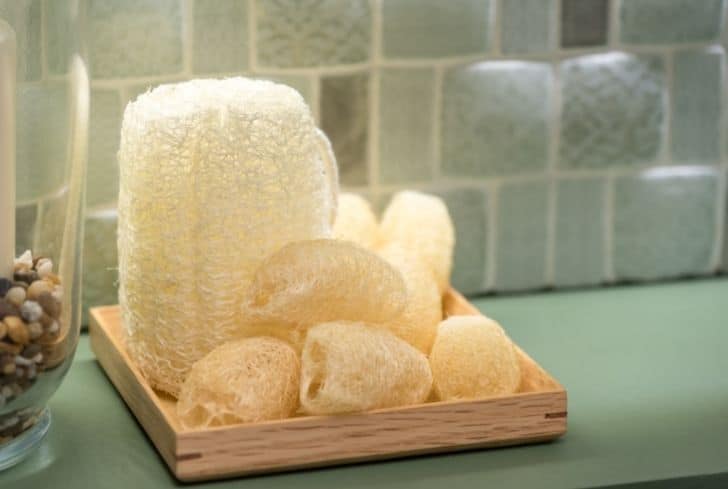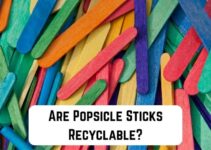Loofahs are amazing sponges that are great for gently cleaning and exfoliating our bodies. If you have used one before, then surely, you know that they get the job of scrubbing dirt off your body done, and done well at that too.
However, they tend to store the dead cells they help pull off our bodies. This is why they have to be cleaned deliberately and properly. Of course, when you clean your loofah properly, then you don’t have to worry about skin problems anymore.
But did you know that even when you clean your loofah properly before use, you still have to change it at regular intervals? This is a common recommendation by most dermatologists. Loofahs aren’t designed to be used forever, they have to be changed at regular intervals. Now, how do you dispose of your old loofah?
Of course, the question of recycling any item you don’t need anymore should be at the back of your mind if you are environmentally conscious. So you may be wondering if you can recycle your old loofahs. Well, we have created this blog post to help answer every question you may have about properly disposing of your old loofahs. Please, dive in!
Can You Recycle Loofahs?
Most dermatologists recommend that after taking a shower, you wash your loofah thoroughly and ensure they dry off properly. You do this because you want to prevent the growth of bacteria and harmful microorganisms on your loofah. Even when you do this, you are still expected to change your loofah every month at the very least.
Of course, this means at the end of each month, you are left with a loofah to dispose of.
Now, how do you dispose of them? Well, if you are environmentally conscious, then you certainly want to recycle them. So you are wondering if they can be recycled.
Here goes. Absolutely! You can recycle your old loofahs. Loofahs are made from #4 plastic. #4 plastic is relatively safer for the environment than other types of plastic. Here’s the drawback. Before you take your old loofahs down to the recycling center, ensure you inquire first if they accept loofahs made from #4 plastic. If they don’t, then you may use a recycling locator to find the nearest recycling center that accepts plastic loofahs.
If you use natural loofahs, then disposing of them shouldn’t be an issue for you. Natural loofahs grow in abundance, and so do not need to be recycled. You can simply compost them; they are quite compostable and would decay in a short period.
They are also biodegradable, if you throw them in the bin, you can be assured that they won’t spend a long time sitting in our landfills. In a matter of days, they would be broken down fully by microorganisms.
Of course, there are various ways you can dispose of your plastic and natural loofahs if you either can’t or do not want to recycle them. Some of these tips would leave your mind blown, and we can’t wait to let you in on them.
Are Plastic Loofahs Recyclable?
Plastic loofahs are relatively softer than natural loofahs, so it is quite understandable that you would prefer them to the latter. They are easier to find too, unlike the natural ones that most times have to be imported. You can find them at any store or supermarket that sells toiletries.
The best part is they are affordable too. So you can afford to buy your recommended three packs, use one for a month and replace it almost immediately with the next one. If you use three loofahs in three months, of course, you have to find a way to dispose of them all.
If you are wondering the best way to go about this, then we advise that you recycle them. Plastic loofahs are made from #4 plastic, which is relatively easier to recycle than some other types of plastics.
However, not all recycling centers accept them. They can be a bit difficult to recycle because they are soft, as body sponges ought to be, and can get quite tangly. Here’s what you can do.
You can inquire at your recycling center if they accept plastic loofahs. If they don’t, you still have nothing to worry about. All you need now is a recycling locator. It works wonders.
A recycling locator will point you in the direction of the recycling center that is closest to you, and also accepts what you are looking to recycle. If you don’t want to opt for that, then there are several other ways to dispose of your plastic loofahs in an environmentally friendly manner.
Are Loofahs Biodegradable?
When we are looking to buy loofahs, we are always presented with the option of going for a plastic or natural one. Most people go for plastic loofahs because they are softer and easier to replace. Now, what do you do when you have a couple of old plastic loofahs your recycling center just won’t accept?
Did it cross your mind to throw them in the trash? Well, if it did, then taking that step means that the loofahs would end up taking up space at our landfills. Plastic loofahs are made from plastic, obviously, and plastic most times does not decompose.
To tag a material biodegradable, it has to be one that can be broken down by microorganisms. Plastic is a material that cannot easily be broken down by the actions of living organisms. They just end up sitting at landfills for several decades, and when they eventually get broken down, the pieces never really go away.
Plastics are also toxic to the environment. Of course, they are not harmful when you use them. For instance, your clean plastic loofah is perfectly safe when it comes in contact with your body. But when they are disposed of carelessly, that is another matter entirely.
Plastic loofahs are made from plastic, and so are capable of releasing toxic pollutants into the environment, and these pollutants are bad for us and our environment. So when next you consider disposing of your plastic loofahs, be sure to do it the right way.
Well, you guessed it. Natural loofahs certainly are biodegradable. They were once living organisms, so they can be broken down by the actions of microorganisms. The process would happen at a fast rate that would leave your mind blown.
Are Loofahs Compostable?
The question about whether loofahs are compostable is a relative one. If you are opting for natural loofahs, of course, they are compostable. You can add your old natural loofahs to your compost pile, and in a matter of about 30 days, it will be entirely broken down.
It will certainly serve as a healthy fertilizer for the plants in your garden if you have a green thumb. An excellent way to dispose of natural loofahs if you don’t have a garden is to gift them to your friends who enjoy gardening. Be sure to inform them that the loofahs are specifically for composting and that you have used them before.
Now, on to plastic loofahs. Well, plastic loofahs are made from plastic, especially #4 plastic. These loofahs are usually soft, which is why we love them so much.
However, don’t be fooled by their softness. They are made from plastic and are therefore not compostable. Plastic materials take a very long time to get broken down by microorganisms; adding them to your compost pile would be a futile attempt.
They will not break down. Rather, they will serve as pollutants for your compost pile, your environment and may even be harmful to you. Of course, the plastic loofahs will break down, but only gradually, at a really slow pace.
During this process, certain toxic gases are released into the environment. They’re released into the air you breathe in, and if you have added them to your compost pile, you can be sure that they will contaminate the remaining materials there.
You can compost your natural loofahs but certainly cannot add plastic loofahs to your compost pile.
Are Loofahs Bad For the Environment?
Your loofah may or may not be bad for the environment. Here’s why. Using a natural loofah certainly poses no harm to the environment. For one, they are renewable resources; they grow on trees.
So for each loofah that is harvested, a new one grows in its place. As long as the trees are well taken care of, you can rest assured that natural loofahs aren’t going into extinction anytime soon. The best part is, they need little to no processing before they can be used, which means no toxic gases or waste materials are released into the environment.
Sadly, the same cannot be said for plastic loofahs. Plastic loofahs are made from #4 plastic. This type of plastic is considered one of the safest types, but it is still plastic.
Plastics are petroleum by-products. As we all know, petroleum is one of our non-renewable natural resources. It is also a known fact that we are gradually running out of petroleum reserves in the world.
Now, a material that is bad for the environment is one that manufacturers make from materials that can be depleted, for instance, petroleum. Aside from that, the manufacturing process also poses harm to the environment.
Here’s how. Processing plastics and making them the versatile materials they are today requires a lot of chemicals. When these chemicals serve their purposes, they are disposed of. The sad part is most manufacturers are never really cautious when they dispose of these chemicals, and the waste chemicals most times end up in our water bodies, soil, and sometimes, the atmosphere.
Of course, the chemicals are strong enough to kill aquatic animals, deplete the ozone layer, poison the air, and also damage the soil. Unfortunately, plastic loofahs are not good for the environment. Opt for a natural loofah if you can.
What to Use Instead of a Loofah?
Aside from environmental pollution by plastic loofahs, there are various other reasons you may need to opt for other methods of cleaning your body in the shower. For one, loofahs tend to accumulate bacteria and fungi. Of course, these are bad for your skin. They can also be a bit difficult to maneuver, especially when you want to wash places like your back.
So if you are looking for better options, you may opt for an exfoliating back scrubber, a bath cloth, a brush set, specially made bath sponges, and washcloths. These are all excellent alternatives; however, they also have to be cleaned regularly and thoroughly.
Conclusion
Loofahs are great, but they have a couple of drawbacks You also have to worry about disposing of them. Of course, recycling should be the immediate solution; however, that isn’t always an available option.
Instead, you may opt for loofahs that won’t be harmful to the environment when you dispose of them or find several ways to repurpose your old loofahs.
References:
https://www.healthline.com/health/loofah-sponge
https://www.refinery29.com/en-us/when-to-throw-out-body-skin-care-products






